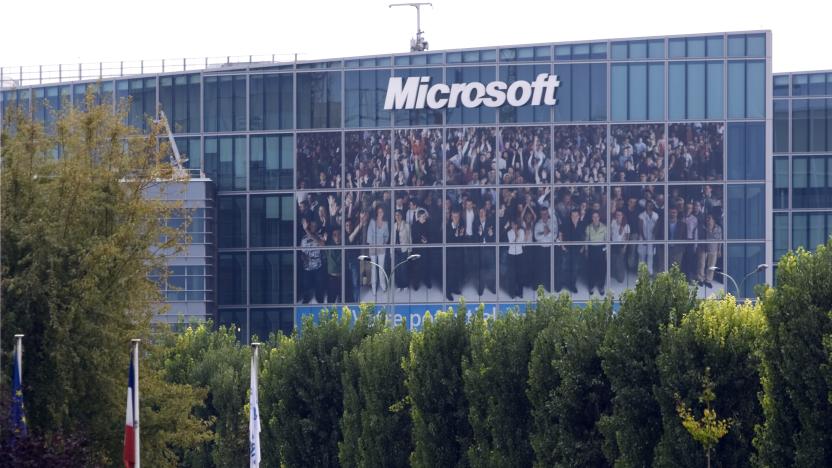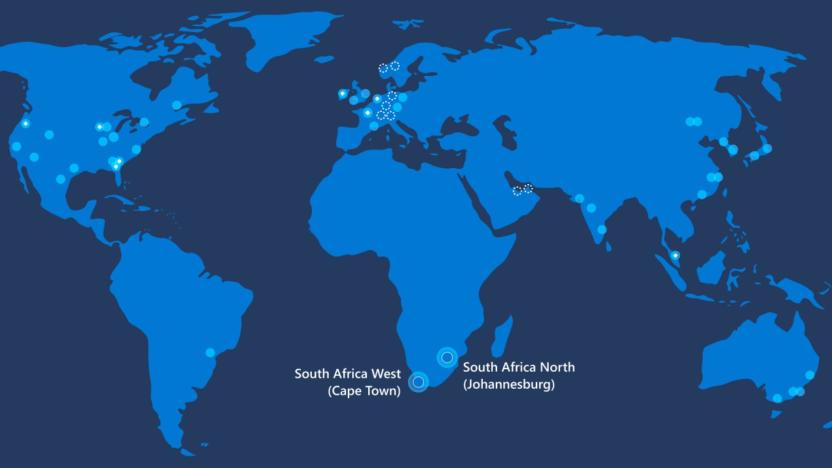cloud computing
Latest

Google pursues Pentagon cloud contract in spite of past employee concerns
Three years after its involvement with the military’s controversial Project Maven program led to employee strife within its walls, Google reportedly hopes to once again work with the Pentagon.

DOD cancels $10 billion JEDI contract at center of Microsoft and Amazon feud
The Department of Defense is canceling its $10 billion Joint Enterprise Defense Infrastructure (JEDI) cloud contract.

Microsoft partners with SpaceX on a cloud computing business for space
Microsoft has launched a new cloud computing business in an effort to make Azure the space industry’s platform of choice. The tech giant says it’s developing technologies to help the public and private sectors launch faster and to make sure they achieve mission assurance. One — and the first — of those technologies is the Azure Orbital Emulator, which is capable of conducting massive satellite constellation simulations.

Microsoft's Project HSD is all about holographic storage for the cloud
Microsoft's Project HSD is exploring holographic storage for cloud computing.

Pentagon says Microsoft still deserves $10 billion JEDI cloud contract
After an internal investigation, the US Department of Defense (DoD) announced that is standing by its decision to award the $10 billion JEDI cloud computing contract to Microsoft and not Amazon.

The rise of cloud computing has had a smaller climate impact than feared
As more and more gargantuan data centers come on line, environmentalists have been concerned about massive increases in electricity consumption and pollution. However, according to a new study published in Science, that simply hasn't happened. While cloud computing output has jumped by 600 percent from 2010 to 2018, energy consumption rose by just 6 percent. That's because companies like Google have massively increased efficiencies with new chip designs, custom-tailored airflow solutions and other tech.

Amazon sues to challenge Microsoft's $10 billion JEDI contract win
Amazon is acting on its promise to challenge the Pentagon's decision to award Microsoft a key $10 billion cloud computing contract. The internet giant filed a federal lawsuit on November 22nd to contest the Defense Department's choice for the coveted Joint Enterprise Defense Infrastructure (JEDI) contract. Amazon didn't explain the reasoning behind the suit, although it previously claimed that the decision process included "unmistakable bias" and suggested there was "political influence." In other words, President Trump's animosity toward Amazon allegedly pushed the Pentagon to choose Microsoft instead of the 'rightful' winner.

Microsoft and Amazon will fight for the Pentagon's $10B cloud contract
Amazon and Microsoft are the two final companies in the running for the Defense Department's $10 billion cloud computing contract. The Pentagon's migration to the cloud, known as the JEDI project, was announced in 2017, with some of the biggest companies in the world competing for the prize ever since (although Google sat it out, citing "AI principles").

Microsoft beats Amazon to open the first cloud data center in Africa
Microsoft has become the first major cloud provider to open a data center in South Africa. Its two new Azure facilities in Cape Town and Johannesburg have been in the works since 2017, and while they were originally slated to go live in 2018, their arrival still pips other big players to the post -- Amazon plans to open a data center there in 2020, while Huawei announced back in November its intention to deliver on the continent later this year.

GameStop stores going Azure to stream promos to mobiles
GameStop plans to use Microsoft's Azure cloud computing technology to enhance its retail locations, allowing customers to stream "video game and promotional content" to mobile devices. While not offering a timetable for when the services would be offered, the retailer revealed examples of ways it would use Azure, such as giving customers the opportunity to view game trailers on their smartphones while browsing the store shelves. GameStop will also shift its checkout process to in-store mobile shopping carts that "can be used by the customer to facilitate a faster checkout." Microsoft's Azure technology was previously used by Respawn Entertainment for the developers' first-person shooter, Titanfall. Respawn's Jon Shiring explained in March 2014 that elements of the game's online multiplayer functions like AI hosting and physics calculations relied on the cloud computing tech. GameStop updated its trade-in policies with a four-tiered pricing structure in August. The retailer showed overall declining sales in November, though sales of new hardware was on the rise. [Image: GameStop]

Watch Satya Nadella's first major appearance as Microsoft CEO live
Rumor has it, Microsoft is getting ready to take the wraps off of Office for iPad. Despite that move potentially signaling a shift away from a Windows-first software strategy, the iOS app won't be the only star of the show. It's going to have to share the limelight with yet another, largely untested asset: CEO Satya Nadella. Given his track record at the company and recent statements, we expect to hear plenty about mobile, the cloud and Microsoft as a devices and services company. Chances are, he won't come out sweating and screaming like his predecessor, but if you're curious to see how Nadella stacks up or, you know, have a thing for Redmond's productivity suite, you can watch it all play out here or at the source link below. And get ready for even more of Nadella and the Microsoft crew when they hit the mean streets of San Francisco for the Build developer conference next week. Watch Satya Nadella Live @ 1PM ET

Microsoft adds achievements to renamed Xbox cloud service OneDrive
Microsoft has officially changed the name of its cloud service SkyDrive to "OneDrive." The Windows, Windows Phone, iOS, Android and Xbox One-compatible service will also receive a monthly payment plan option in addition to a new referral program that offers up to 15 GB of additional space when inviting friends and enabling camera roll backup. Xbox One owners can use OneDrive as a means of sharing recorded gameplay clips online in conjunction with the Upload Studio app on the system. The latest improvements to OneDrive includes achievements on the game console, rewarding users for actions like adding a shared folder to OneGuide in the app and viewing 100,000 photos. The achievements do not count towards players' gamerscores, however. [Image: Microsoft]

GoDaddy, Microsoft focus on small businesses with Office 365 partnership
Early last year, Microsoft extended its Office 365 subscription service to small- and medium-sized businesses and now it's continuing that push with a new partnership with GoDaddy. The web-hosting and domain name company will offer Microsoft's suite of productivity tools to its small-business customers, including the ability to easily connect users' domain names to Office's email services. It also brings the full suite of Office's productivity software, including shared calendars, cloud storage and instant messaging. The move comes a little over a year after Blake Irving, a former Microsoft exec, took the helm as GoDaddy's new CEO, where he's focused on expanding its support for small businesses. Office 365 for GoDaddy is already available in the US and Canada and will open up globally later this year.

Amazon 'AppStream' service allows devs to stream games from the cloud
Amazon announced the upcoming introduction of AppStream, a service that delivers high-performance games and other applications via Amazon Web Services cloud streaming. Essentially offering developers the ability to "build complex applications that run from simple devices," AppStream aids in reproducing high-performance, GPU-powered rendering on platforms normally incapable of delivering such performance. Supported applications launch instantly, and can be controlled either with touchscreen input or with linked devices. Microsoft's Xbox One has a similar supplemental cloud service in the works to boost in-game performance, and Amazon's AppStream could potentially help power graphically rich games for mobile and desktop devices. Developers interested in testing out a limited preview version of Amazon AppStream can apply for admission here.

Square Enix demonstrates new Project FLARE game streaming service
Square Enix is chasing the cloud-based gaming market with Project FLARE, a newly announced streaming service that claims to leverage "virtual supercomputers" in order to minimize latency while upping in-game performance and presentation. Comparing Project FLARE to existing streaming services like OnLive and Gaikai, Square Enix notes that its own project offers exponential scalability, making it capable of delivering richer world detail and "real-time, Hollywood-quality" animation. Square Enix demonstrates Project FLARE's potential in a pair of concept videos for Deus Ex: Human Revolution (embedded above) and Final Fantasy XI, showcasing the service's enhanced physics simulation and online multiplayer capabilities. Speaking with Engadget, Square Enix's director of business development Jacob Navok revealed that the company may set up a new business division in order to support the service. "We're very open right now," said Navok said. "We can be our own product, we can offer it to other partners. It's so early now that we don't have a specific way to bring this to consumers just yet."

Microsoft: Cloud turns any Xbox One in the world into your Xbox
Most of the information in this promotional Xbox One video is common knowledge, but a few interesting tidbits can still be gleaned. Albert Penello, lead planner for Xbox, reveals that using your profile on another Xbox One not only gives you access to your purchases, but also your own customized home screen and your game saves. "Basically, any Xbox One, anywhere in the world, is your Xbox," Penello says. In terms of SmartGlass, Penello says the big appeal for Microsoft is discovery – being able to find content on the go, highlight it on a SmartGlass device, then come home and find it right there on Xbox One. "You can browse the entire catalog of games and entertainment on Xbox One on SmartGlass," Penello adds, and "you can navigate the dash; you can navigate your Blu-ray movies." Ryse: Son of Rome and Dead Rising 3 are also specifically called out for their SmartGlass functionality. Ryse lets players customize their characters, set up multiplayer matches and comb through a bunch of other content while away from the console, while Dead Rising 3's integration is more literal – your real-life phone is treated as a phone, and Dead Rising 3 will dispatch mission calls with their own storylines and characters through SmartGlass.

Rumor: Microsoft plays with cloud-based gaming, demos Halo 4 on a PC
Microsoft company officials demonstrated a prototype cloud streaming service for games during an internal meeting this week, The Verge reports. Unnamed sources who are close to the event confirmed that officials had a streamed version of Halo 4 up and running on Windows PCs and even a Windows Phone (including Xbox 360 controller support via an attached peripheral). The demonstration reportedly ran smoothly, with latency on a Lumia 520 phone dipping as low as 45ms. Sony purchased Gaikai earlier this year in a bid to establish a streaming service for the PlayStation 4. Microsoft previously announced that it would use cloud computing to leverage additional processing power for games like TitanFall, but has not confirmed plans for a cloud-based streaming service.

A look at apps with waiting lists
The way we look at new app launches is changing thanks to the cloud. Rather than a full-scale launch that invites everyone to download and try an app, developers are rolling out their apps slowly, opting for a waiting list that meters access to a service. Several high profile apps recently used this new wait list paradigm and The Verge chatted with them about their experience. The conversation focuses on the challenges of storing data remotely and dealing with the unexpected outliers who push a service beyond its tested limits. "Two hundred and fifty [beta testers] is a decent data set, but when you increase that several orders of magnitude you find edge cases," said Mailbox CEO Gentry Underwood. Underwood notes that Mailbox was not prepared for that one user who tried to transfer 40,000 messages into the service on launch day and caused the Mailbox servers to almost buckle under the load. You can read additional commentary from Loom CEO Jan Senderek and Jonathan Benassaya, CEO of Stream Nation in The Verge article.

Microsoft's cloud computing 'vision' for Xbox One remains unchanged
Though Microsoft has changed its stance on the digital rights management-based requirements for the Xbox One, the company remains committed to cloud computing. "Our vision around Xbox One and what you can do because of the power of both the architecture of the console, and also the cloud and the Xbox Live service, remains unchanged," Xbox Chief Product Officer Marc Whitten told Joystiq. When asked why Microsoft would not simply offer an offline mode akin to the one featured on Steam, Whitten said "that's absolutely" what Microsoft is doing. Whitten listed a host of examples of how cloud computing still exists as part of the Xbox One plan, noting players will "see great games like Titanfall take advantage of the cloud processing power" as well as have the ability to get games from the online marketplace and use them on any console. "We're going to continue to really invest in how those experiences work," Whitten added. During E3 2013, Fairfax "Mackey" McCandlish, lead designer on the always-online Titanfall, told Joystiq that cloud computing on the Xbox One allows Respawn to "spin off dedicated servers" whenever it wants. "Instead of having everything prepared ahead of time, or misallocate different areas, or have some places be too slow or too much, we can just say 'cloud, find us the right number of computers,'" he added.

Digital Foundry examines Xbox One cloud computation claims
Beyond Xbox One's TV capabilities, multitasking, nebulous used game policy and terrifying Kinect features, Microsoft has also hinted at the possibility of cloud-enhanced games. Specifically, the company has said elements that aren't sensitive to the inherent latency of cloud computing – things like lighting and physics models – could be improved. Microsoft's Redmond Game Studios and Platforms GM Matt Booty has even gone so far as to say that "[for] every Xbox One available in your living room we'll have three of those devices in the cloud available." Now, Eurogamer's tech-minded Digital Foundry has examined Microsoft's claim to see how feasible it really is. DF notes that it all boils down to latency and bandwidth. Bandwidth is a particularly sticky issue, as current transfer speeds aren't even close to what consoles can achieve on local hardware, ruling out any possibility for real-time calculations in the cloud. There are some less intensive possibilities though, including Microsoft's own example of lighting. DF notes, however, that such lighting would be slow to update, making it best suited for things like time of day changes. Other possibilities include things like NPC AI for games with large worlds. "Cloud computing could run world simulation and just update the player's local world over time, allowing the world to live and respond to player actions," writes DF, though it would be limited to certain types of games (like The Elder Scrolls or Grand Theft Auto). DF concludes that Microsoft's message about Xbox One's cloud capabilities is still vague, and that there's no clear incentive for third-party developers to utilize it when developing multiplatform games. Digital Foundry acknowledges the potential for "less exciting, though certainly valuable" possibilities, mostly for multiplayer games, but believes Microsoft will have to "prove its position with strong ideas and practical demonstrations."











